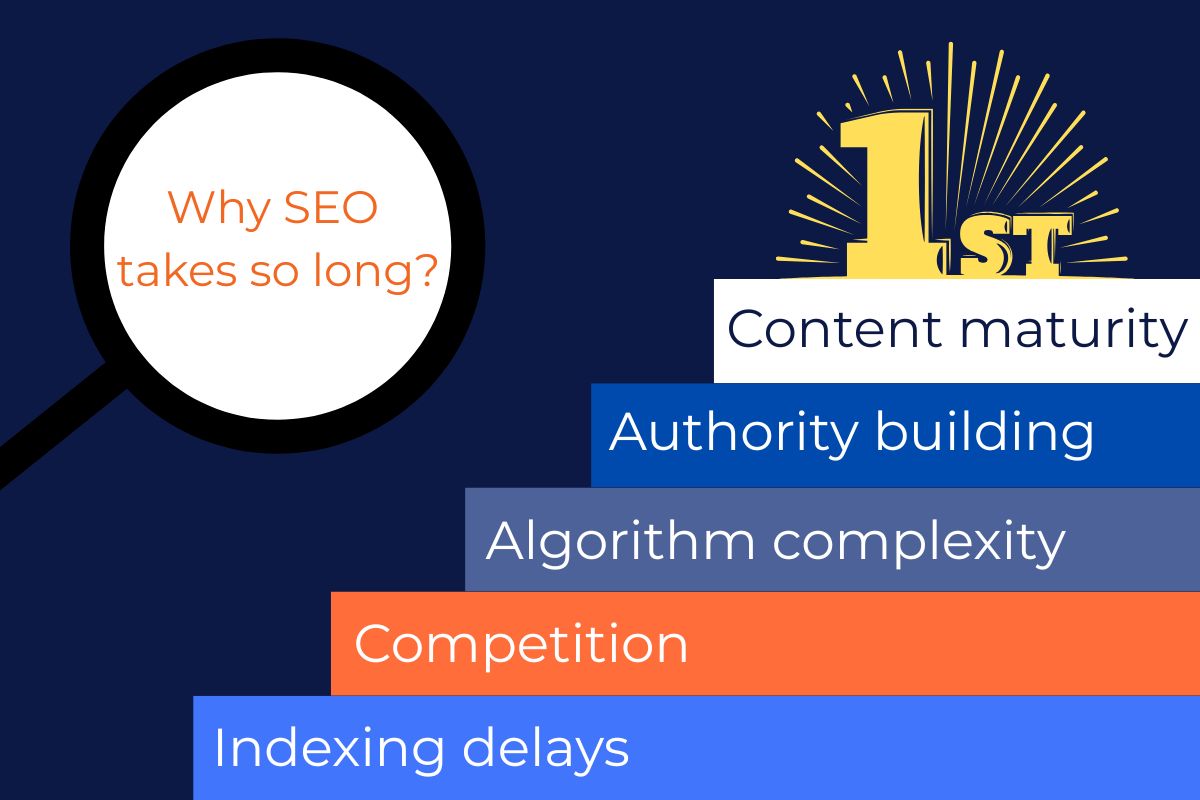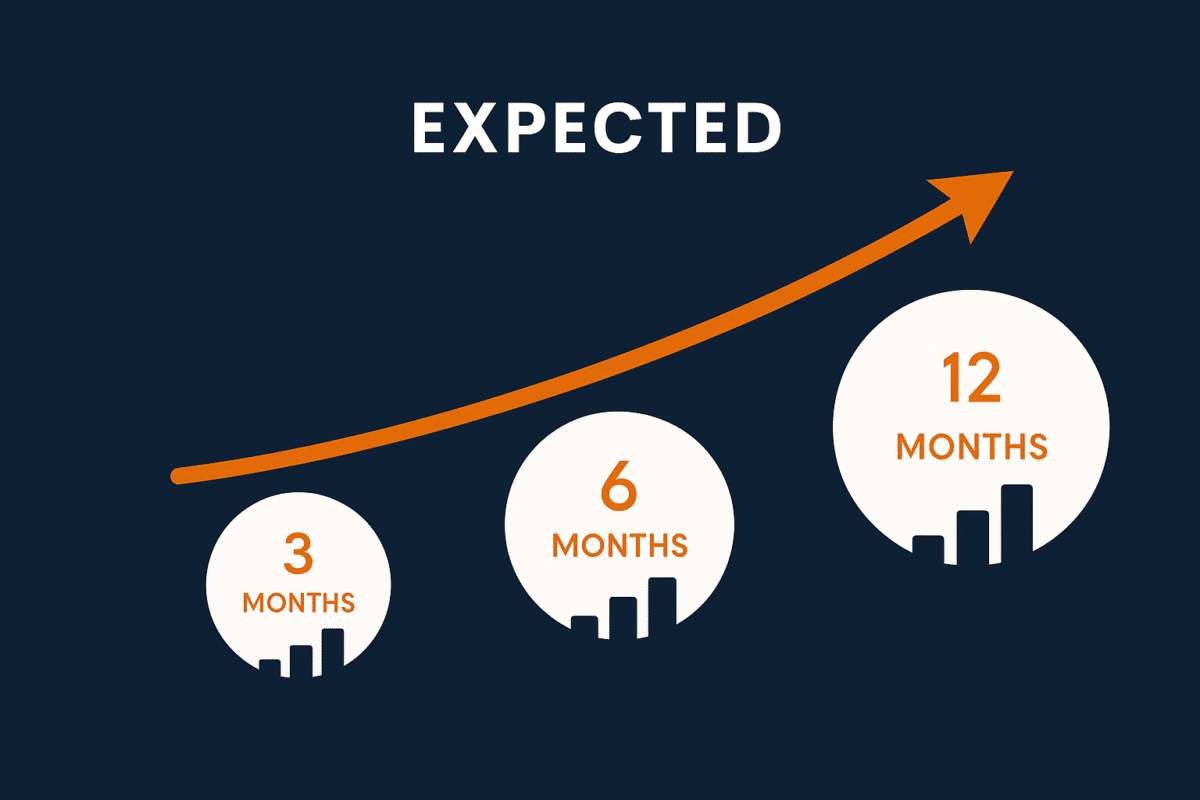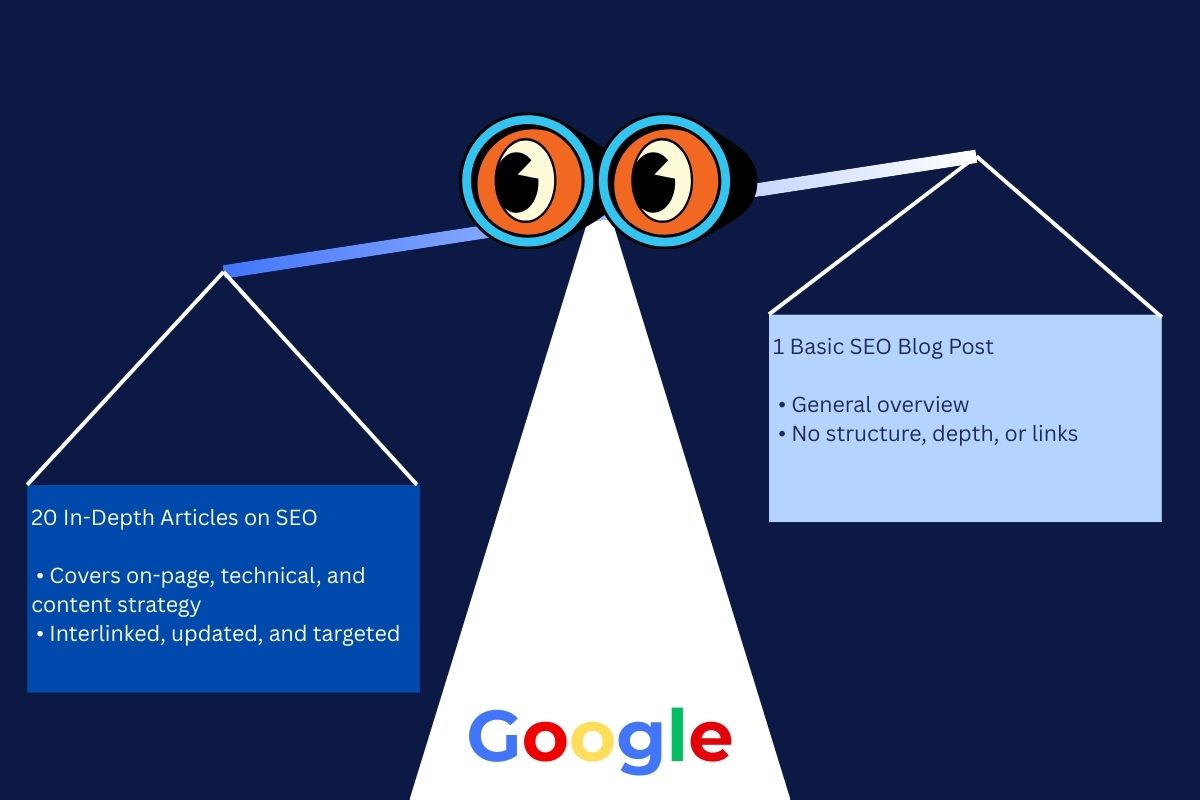Search engine optimization is not a quick fix. Unlike paid ads that offer immediate visibility, SEO is a marathon built on consistency, quality, and trust. It’s common to hear business owners ask, “How long does SEO take?” — and the honest answer is: it depends.
But one thing is certain—SEO takes time to get results, and understanding why is essential for anyone serious about building lasting online visibility. Indexed Zone SEO is here to break down what you can expect from the SEO efforts, realistic month-by-month goals, and how your brand benefits long-term, so let’s jump in!
Why SEO Takes Time: The Core Truth
Search engines reward relevance, authority, and user experience. These aren’t things that happen overnight – they are earned over time.

Let’s break down the main reasons why SEO takes so long:
- Indexing delays: After publishing, content needs to be crawled, indexed, and evaluated before it can appear in rankings.
- Competition: If targeting high-volume keywords, others have already built trust and backlinks—closing that gap takes effort.
- Algorithm complexity: Google evaluates hundreds of ranking factors, including content quality, site speed, backlink profile, mobile usability, and more.
- Authority building: Backlinks and brand signals take time to accumulate, especially in competitive niches.
- Content maturity: Google often prefers older, updated, well-performing content over brand-new pages.
How Long Does SEO Take?
Now, let’s address the most frequently asked question: How long does it take for SEO to take effect?
Most campaigns begin to show meaningful progress between 3 and 6 months, but reaching the top positions for competitive terms can take 12 months or longer.
Key Variables That Influence Timeline:
- Website history: New domains take longer than aged, trusted sites.
- Content quality and volume: More high-value content = faster potential growth.
- Backlink profile: Strong links accelerate authority building.
- Technical health: Issues like crawl errors, slow speed, or broken pages can slow everything down.
- Competition level: High-authority competitors will take more time to outrank.
So, how long does SEO take to work? Typically, at least 3–6 months for early signs, and 12+ months for consistent high rankings and ROI.
SEO Is a Long-Term Strategy — Here’s Why
Search optimization is not a one-and-done campaign. You need a long-term SEO strategy built on:
- Consistency in content creation
- Link earning over time
- Ongoing technical refinement
- Monitoring and adapting to algorithm updates
A solid SEO long-term strategy should include quarterly audits, content updates, and continuous keyword research. It’s about building value for your website that grows with time, like steady growth for your website..
Pro Tip:
Did you know that one of the most overlooked long-term wins in SEO is historical optimization?
Updating old, underperforming blog posts with new data, refreshed structure, and improved on-page SEO can deliver faster ranking boosts than creating brand-new content.
When Should You Expect SEO Results: Month-by-Month Breakdown
In order to set clear expectations, you need a full understanding of SEO’s progression. With that in mind, let’s have a look at a general timeline.

Month 1:
- Strategy planning, keyword research, site audit
- Technical fixes begin
- Content gap analysis
Months 2–3:
- Content creation and publishing ramp up
- On-page SEO and internal linking improvements
- Technical SEO continues
Months 4–6:
- Search engine positioning starts to improve
- Early keyword ranking increases
- Backlink outreach begins
Months 6–12:
- Pages gain more authority and engagement
- Rankings improve noticeably
- Leads or conversions begin to pick up
- Ongoing optimization and scaling
Beyond 12 Months:
- Steady growth through content updates and backlink profile strengthening
- Competitive keywords start ranking
- Clear ROI emerges
- SEO becomes a central brand strength
Keep in mind that at every stage, the focus should be on long-term goals, not chasing fast wins.
The Role of Content Depth and Topical Authority in SEO Timelines
One of the major reasons SEO takes time (but is rarely emphasized) is the need to build content depth and establish topical authority. Both are critical for long-term success and influence how Google perceives your site’s relevance in your niche.
Content Depth: More Than Just Keywords
Content depth refers to how thoroughly your page addresses a topic. Thin, surface-level content might get indexed, but it won’t outrank pages that provide comprehensive answers, multimedia support, internal links, and structured formatting.
Deep content:
- Answers multiple layers of search intent
- Includes FAQs, examples, statistics, and visuals
- Stays updated with fresh information
- Anticipates follow-up questions a reader might have
Topical Authority: Becoming a Trusted Resource
Topical authority goes beyond one strong page. It’s about your entire site being recognized as a reliable source on a specific subject. This is earned by publishing a network of high-quality, interlinked content that consistently addresses a niche.

For example, a website with 20 detailed articles on SEO best practices—covering on-page, technical, and content strategy—will likely rank better than a general site with one post on SEO.
This process takes time and consistency. But once Google sees your site as a subject matter expert, you’ll rank faster and more reliably, making the wait well worth it.
How Google’s Trust Signals Shape SEO Results Over Time
Another factor behind SEO’s delayed payoff is the way Google gauges trust, also known as E-A-T (Expertise, Authoritativeness, Trustworthiness). These signals aren’t measured in days or weeks; they’re earned over time through consistent content quality, user engagement, and off-page validation.
Google doesn’t take new websites at face value. It waits to see how users interact with your site: Do they bounce quickly? Do they return? Do they share or link to your content? These behavior patterns help search engines evaluate whether your site is genuinely helpful or just trying to game the system.
Trust is also established through third-party validation: backlinks from credible sources, brand mentions, citations, and reviews. But again, these things are earned. You can’t rush them with tricks or paid promotions – Google’s algorithm is designed to recognize organic signals of value and reliability.
For YMYL (Your Money, Your Life) niches like finance, health, or legal, this vetting process is even stricter. Google holds these industries to higher standards due to their impact on user well-being. Even with high-quality content, building credibility in those areas still takes time.
The good news? Once you cross that trust threshold, rankings become more stable, and your site is more resilient to algorithm updates. That’s why investing in long-term trust-building isn’t optional—it’s essential for lasting SEO success.
FAQs
What is considered a long-term SEO strategy?
A strategy built on content publishing, backlink building, and technical SEO, executed over 12+ months, with a focus on sustained traffic and growth, not short-term hacks.
Is SEO faster for local businesses?
Yes, SEO can be faster for local businesses due to lower competition and more specific keyword targeting (e.g., “plumber in Austin”). Local SEO strategies like Google Business Profile optimization, local citations, and reviews can show results within 1–3 months.
Can SEO results drop after reaching the top?
Absolutely. Rankings are never guaranteed. Competitors can outrank you with fresher content or stronger links. Algorithm updates can also affect your visibility if your site doesn’t meet new quality standards.
How can I speed up my SEO results safely?
While there are no shortcuts to instant rankings, you can accelerate progress by:
- Focusing on long-tail keywords with lower competition
- Publishing content consistently
- Fixing technical issues early
- Earning high-quality backlinks through PR and outreach
- Updating old content for quick wins
Just avoid black-hat tactics—they might provide a spike, but risk long-term penalties.
Turn Patience Into Performance: Build SEO Momentum the Right Way
SEO is an investment, not a sprint. It’s understandable to ask how long SEO takes to show results, but a more productive mindset is to align strategy with patience. Focus on quality work, consistent output, and smart technical decisions, and the returns will come steadily and sustainably.
Remember, SEO isn’t just about traffic – done right, it becomes a powerful brand-building engine.
High visibility in search positions your business as a trusted authority. When someone sees your brand on page one for multiple terms over time, it builds recognition, loyalty, and trust. That’s how SEO works to strengthen your brand organically.
This slow burn is also why SEO takes time to get results – after all, it’s about earning trust the right way, rather than renting it with ads.


